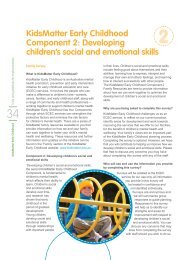Suggestions for families and staff - KidsMatter
Suggestions for families and staff - KidsMatter
Suggestions for families and staff - KidsMatter
- No tags were found...
Create successful ePaper yourself
Turn your PDF publications into a flip-book with our unique Google optimized e-Paper software.
Olderfbabiesf(sixfmonthsftofaroundfonefyear)fBabies of this age are usually eating somesolid food, trying out their arms <strong>and</strong> legsby learning to sit up, crawl <strong>and</strong> then st<strong>and</strong><strong>and</strong> perhaps walk. Soon after six monthsthey learn that things still exist when theycannot see them, including parents <strong>and</strong>carers. Babies of this age become worriedwhen they can’t see their parent or carer<strong>and</strong> might cry at bedtime or other timeswhen they are separated. This is a normalpart of developing <strong>and</strong> realising that theirsignificant caregivers are really important tothem <strong>and</strong> keep them safe. They might alsobe afraid of strangers, <strong>and</strong> sometimes evenpeople they know. Many babies still wakeat night but can be quickly com<strong>for</strong>ted byknowing a parent is with them.Somefsignsfthatfanfolderfbabyfmightfneedfmorefsupport:It would be appropriate to seek theadvice of a health professional if ababy:ffcannot settle to sleep even whentheir parent or carer is with themffdoes not look into the parent’sor carer’s eyesffdoes not enjoy little interactivegames with their parent or carerffcannot be com<strong>for</strong>ted by theirparent or carer when cryingffis withdrawn, not interestedin playing <strong>and</strong> toysffis not making lots of little voicesoundsffstiffens <strong>and</strong> arches back whenbeing heldffdoes not turn to you whenyou say their nameffis not starting to move around (<strong>for</strong>example, at least trying to crawl)ffdoes not look <strong>for</strong> things whenthey drop themffdoes not seem to especially wantto be with their parent or carer.Toddlersf(onefyearftofaroundfthreefyears)Toddlers are learning about being separate people <strong>and</strong> wanting to use theirindependence <strong>and</strong> say ‘No’. They do not yet have good control of their feelings<strong>and</strong> are likely to have a tantrum if they are frustrated (<strong>for</strong> example, whensomething does not go how they want it to). They need lots of support fromtheir parents <strong>and</strong> carers, as they move between being independent <strong>and</strong> needingsupport <strong>and</strong> com<strong>for</strong>t. They also like to have their world predictable as this helpsthem feel safe with all the new things they are learning, (<strong>for</strong> example, they areoften very particular about what foods they like <strong>and</strong> do not want to try newthings). They also may like to do things the same way each time (<strong>for</strong> example,reading the same bedtime story or getting very upset if someone changes theway they do things). They find playing with other toddlers hard <strong>and</strong> need lots ofadult support. They find it hard to share, take turns <strong>and</strong> make choices, althoughthey want to try. If they have a dummy or other com<strong>for</strong>t toy they need it whenthey feel stressed or are separated from their carers (<strong>for</strong> example, at bedtime).Somefsignsfthatfaftoddlerfmightfneedfmorefsupport:It would be appropriate to seek the advice of a health professional if atoddler:ffhas tantrums many times a day, or is not able to be com<strong>for</strong>ted at theend of the tantrumffis continually biting other childrenffdoes not have any words by 18 months, or signs <strong>for</strong> wordsffdoes not put two words together by two yearsffdoes not look at things when you point at them, <strong>and</strong> does not point atthingsffdoes not enjoy playing interactive games with parents or carersffdoes not playffdoes not smile <strong>and</strong> enjoy being with well-known adultsffmay use toys repetitively, doing the same thing over <strong>and</strong> over such asspinning a wheelffdoes not prefer to be with special parents or carersffdoes not seem to notice when hurtffdoes not imitate household tasks by age twoffdoes not like to be near other childrenffis equally friendly to everyone, not favouring parents or carersffis not com<strong>for</strong>ted by parents or carers when upset.2 Supporting children’s mental health: <strong>Suggestions</strong> <strong>for</strong> <strong>families</strong> <strong>and</strong> <strong>staff</strong><strong>KidsMatter</strong> Early Childhood – www.kidsmatter.edu.au
Supporting children with mental health difficultiesAfter an assessment has been completed, the mental health professional willdiscuss with parents or carers (<strong>and</strong> early childhood <strong>staff</strong> where appropriate)what their child’s difficulties are <strong>and</strong> how they can use the child’s strengths torespond to these concerns. The mental health professional will work closelywith parents <strong>and</strong> carers in the care of their child during this time. Sometimesthis will involve visits to the mental health professional (either with or withoutyour child), visits to your home or to the early childcare service that your childattends.Parents <strong>and</strong> carers may have specific questions they would like to ask such as:ffWhat is the evidence to support the success of this method <strong>for</strong> respondingto my child?ffWhat other options are available?ffHow will I be involved in responding to my child?ffHow can I in<strong>for</strong>m early childhood <strong>staff</strong> about the best ways to respond tomy child?ffHow will I know if what I am doing is working?ffHow long should it take be<strong>for</strong>e I see an improvement?Responding to children with mental health difficulties requires them to learnnew skills <strong>and</strong> new patterns of relating to others. This takes time <strong>and</strong> practice.Children will often have to practise new skills <strong>and</strong> patterns at home <strong>and</strong> at theearly childhood service. Regular discussions between parents, carers, earlychildhood <strong>staff</strong> <strong>and</strong> mental health professionals can help make sure that thechild is being supported in the most effective way.Keep in mind thata service which hasworked well <strong>for</strong> onechild may not bethe best fit <strong>for</strong> adifferent child witha similar difficulty,as each child hasindividual <strong>and</strong> uniqueneeds based on theirexperiences.Supporting children’s mental health: <strong>Suggestions</strong> <strong>for</strong> <strong>families</strong> <strong>and</strong> <strong>staff</strong>5In<strong>for</strong>mation <strong>for</strong> early childhood <strong>staff</strong> <strong>and</strong> <strong>families</strong> Component 4 – Helping children who are experiencing mental health difficulties



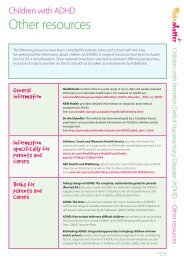
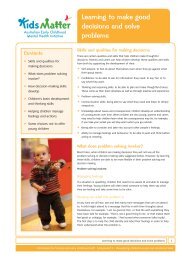
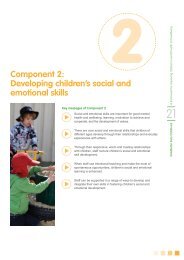

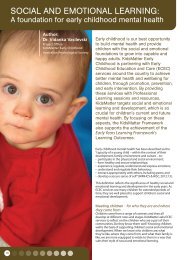
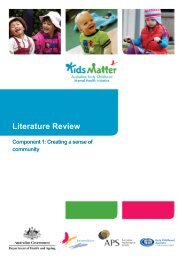
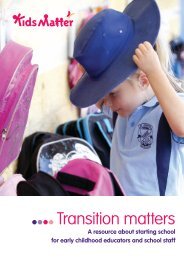
![Trinity Anglican School - Cairns story [378KB]pdf - KidsMatter](https://img.yumpu.com/41716076/1/184x260/trinity-anglican-school-cairns-story-378kbpdf-kidsmatter.jpg?quality=85)
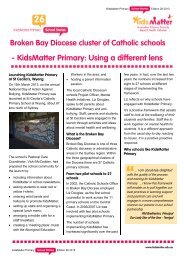
![Happy families work together [327KB] PDF - KidsMatter](https://img.yumpu.com/40767384/1/184x260/happy-families-work-together-327kb-pdf-kidsmatter.jpg?quality=85)
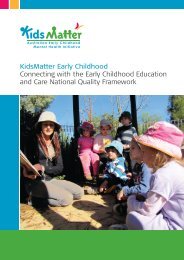
![Action Team Handbook 2012 [1.9M] [PDF] - KidsMatter](https://img.yumpu.com/38050920/1/184x260/action-team-handbook-2012-19m-pdf-kidsmatter.jpg?quality=85)
![[1008KB]pdf - KidsMatter](https://img.yumpu.com/38050895/1/184x260/1008kbpdf-kidsmatter.jpg?quality=85)
